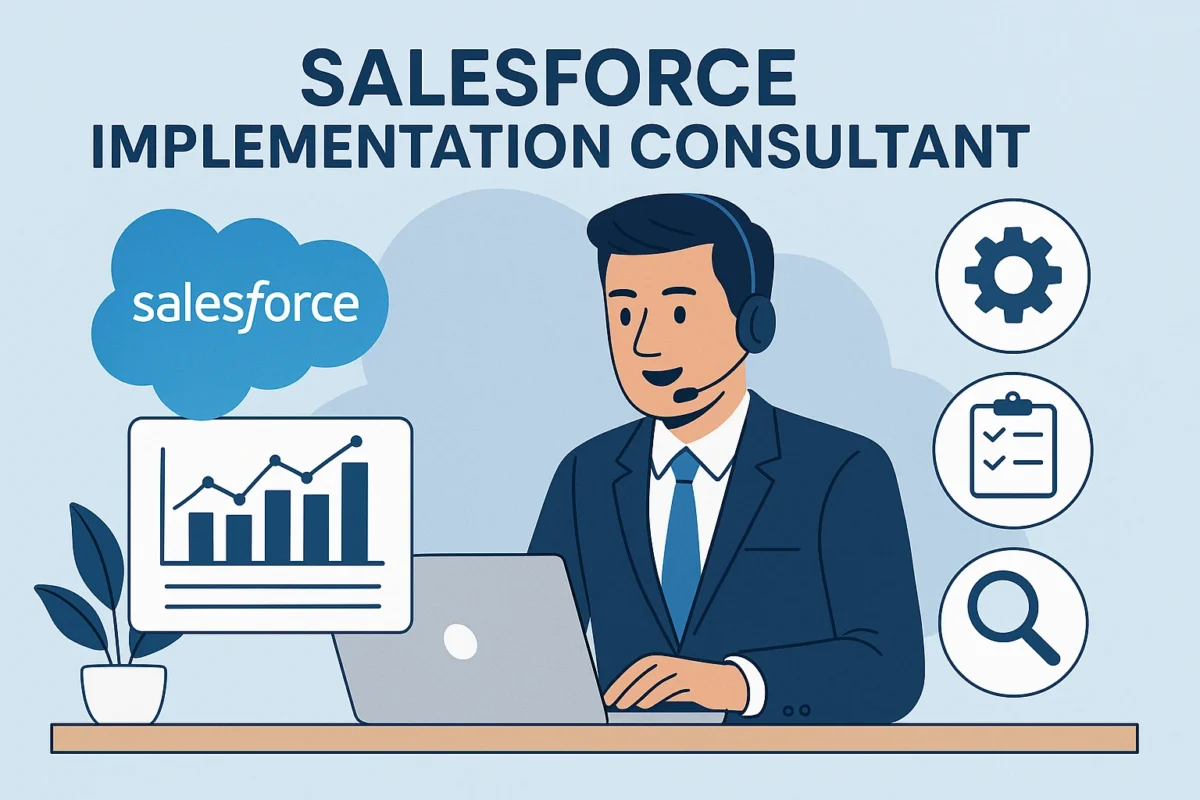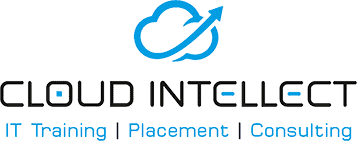
If you’re passionate about CRM platforms and want to help businesses succeed, becoming a Salesforce Implementation Consultant could be the perfect career move. With over 150,000 companies using Salesforce, the demand for skilled professionals who can implement and optimize the platform is skyrocketing.
In this guide, we’ll explore how to become a Salesforce Implementation Consultant, essential skills, top certifications, and your career growth roadmap.
🚀 Who is a Salesforce Implementation Consultant?
A Salesforce Implementation Consultant helps organizations deploy, configure, and customize Salesforce to match business needs. They collaborate with stakeholders, map out workflows, and ensure a smooth rollout that drives ROI and user adoption.
🎯 Key Responsibilities of a Salesforce Implementation Consultant
-
Understanding client business processes and requirements
-
Designing Salesforce solutions (Sales Cloud, Service Cloud, etc.)
-
Configuring objects, fields, workflows, and automations
-
Data migration and system integration
-
User training and post-deployment support
-
Collaborating with developers and admins for custom features
📚 Required Skills to Become a Salesforce Implementation Consultant
To stand out in this field, you’ll need both technical knowledge and consulting soft skills. Here’s what hiring managers look for:
🔧 Technical Skills:
-
Proficiency in Salesforce platform features (Lightning, Process Builder, Flows)
-
Data migration tools (Data Loader, Import Wizard)
-
Basic knowledge of Apex, Visualforce (optional but helpful)
-
Report and dashboard creation
-
Understanding of integration APIs and middleware (like MuleSoft or Zapier)
🤝 Soft Skills:
-
Business analysis and problem-solving
-
Communication and stakeholder management
-
Project management (Agile/Scrum familiarity)
-
Presentation and documentation skills
🏅 Top Salesforce Certifications for Implementation Consultants
Certifications not only boost your credibility but also help you learn Salesforce systematically. Here are the most recommended:
| Certification | Why It’s Important |
|---|---|
| Salesforce Administrator | Foundation of platform knowledge |
| Salesforce Advanced Admin | Deeper configuration and automation |
| Salesforce Platform App Builder | For building apps and advanced flows |
| Salesforce Sales Cloud Consultant | Specialized in sales process automation |
| Salesforce Service Cloud Consultant | Specialized in service operations |
🔑 Pro Tip: Start with Admin → then App Builder → followed by Consultant-level certifications based on your focus.
🗺️ Career Path: From Learner to Salesforce Implementation Consultant
Here’s a step-by-step career roadmap:
Step 1: Learn Salesforce Basics
Use Trailhead (Salesforce’s free learning platform) to get started. Complete beginner trails and earn Superbadges.
Step 2: Get Salesforce Certified
Pass the Salesforce Certified Administrator exam to prove your foundational knowledge.
Step 3: Work on Real Projects
Join internships, volunteer for NGOs, or do freelance projects to gain hands-on experience in implementation.
Step 4: Specialize with Consultant Certifications
Depending on your niche (Sales, Service, Nonprofit), pursue relevant consultant certifications.
Step 5: Join a Salesforce Partner or Consulting Firm
Many consultants start their careers in Salesforce partner companies that deliver client implementations.
💼 Average Salary of a Salesforce Implementation Consultant
According to Glassdoor and Payscale:
-
Entry-level (0–2 years): ₹4–6 LPA in India / $70,000 in the US
-
Mid-level (3–5 years): ₹8–15 LPA / $90,000–$110,000
-
Senior (5+ years): ₹18+ LPA / $120,000+
💸 Salesforce consultants often earn bonuses and project-based incentives.
🔍 How to Get Your First Job as a Salesforce Implementation Consultant
-
Build a strong LinkedIn profile with Trailhead badges
-
Contribute to Salesforce Community Groups
-
Add your certifications on resume and highlight projects
-
Apply to roles like Salesforce Associate, Admin, Analyst to break in
-
Join platforms like Talent Stacker or CloudIntellect to get career-ready
📌 Why Choose a Career as a Salesforce Implementation Consultant?
-
High demand & job security
-
Opportunities across industries (Finance, Healthcare, Retail, etc.)
-
Remote work options
-
Clear career path to Solution Architect or Project Manager
-
Lucrative compensation and continuous learning
🙋♂️ FAQ: Salesforce Implementation Consultant
Q1. What qualifications do I need to become a Salesforce Implementation Consultant?
You don’t need a formal degree, but certifications like Salesforce Certified Administrator are crucial. A background in business, IT, or project management is helpful.
Q2. Can I become a Salesforce consultant without coding?
Yes! Many Salesforce consultants work with clicks, not code. Coding (Apex) is optional unless you want to move into a developer or architect role.
Q3. How long does it take to become a Salesforce Consultant?
With focused learning, you can become job-ready in 4–6 months. Real-world project experience accelerates your journey.
Q4. What’s the difference between a Salesforce Admin and Consultant?
An Admin manages the platform internally, while a Consultant works with external clients to design and implement solutions.
Q5. Is Salesforce a good long-term career?
Absolutely! With growing demand, evolving technologies, and competitive salaries, Salesforce offers a future-proof tech career.
🔚 Conclusion
Becoming a Salesforce Implementation Consultant is a smart move in today’s digital-first world. With the right skills, certifications, and experience, you can build a rewarding career that combines technology, business strategy, and impactful solutions.

